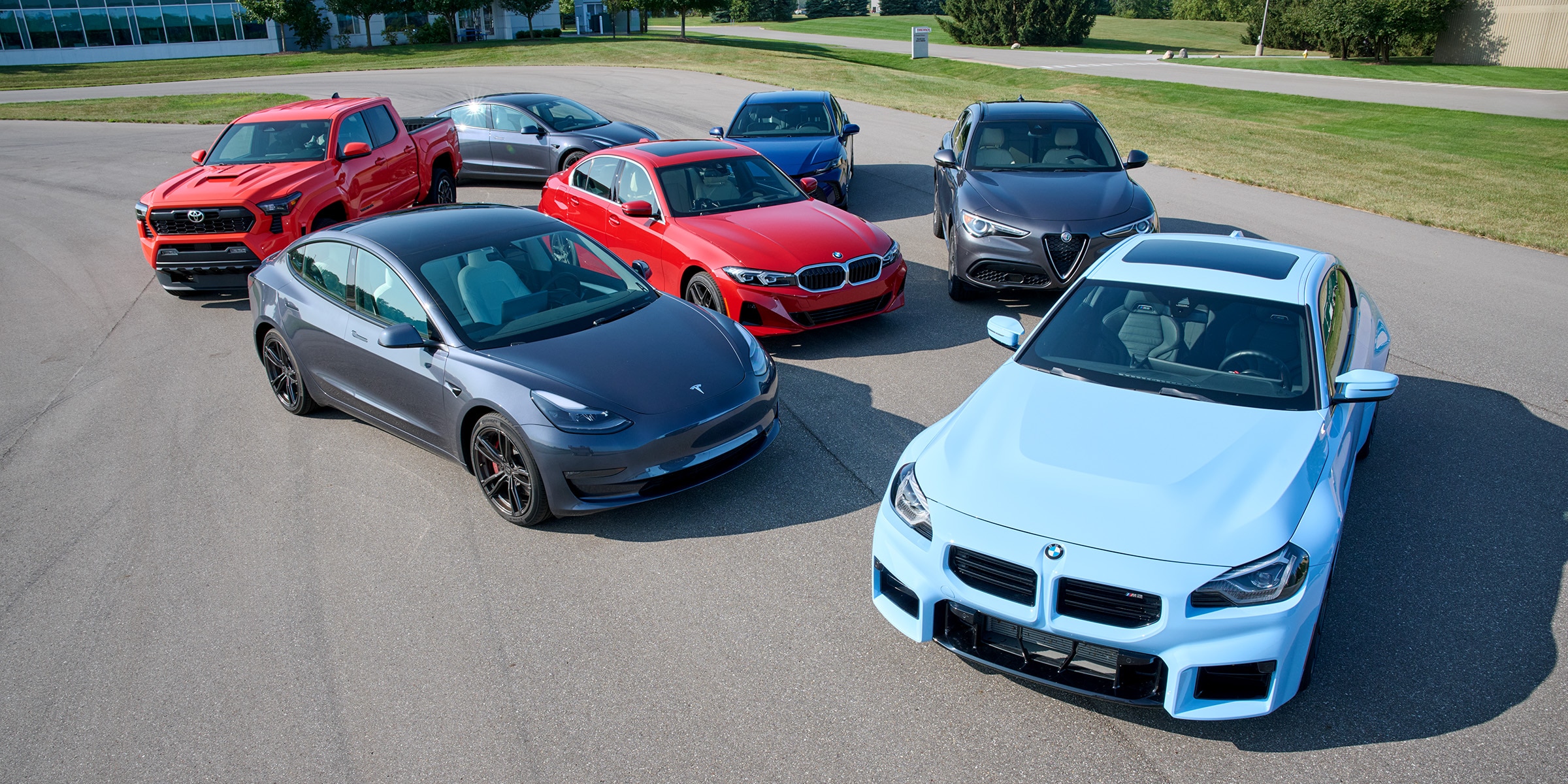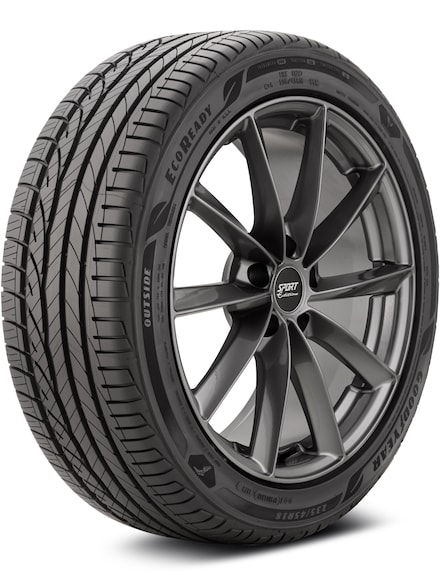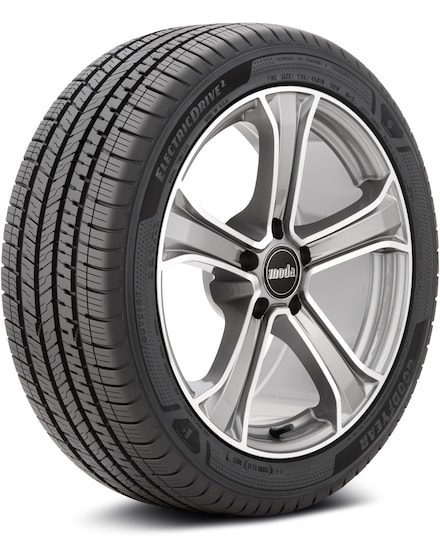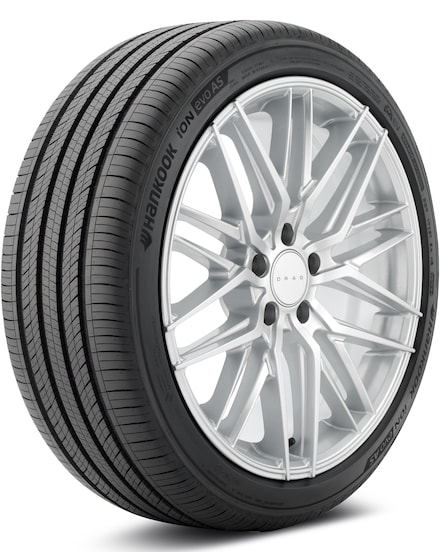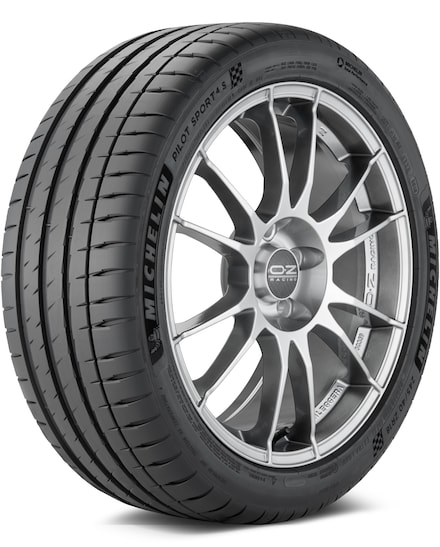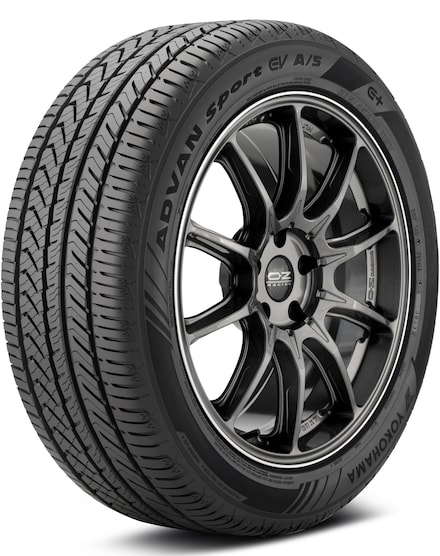Spider Chart Comparison
Want to really get down to it with the data? Try this head-to-head comparison. When favorites are selected, this chart will default to showing favorites first.
Test Report
Introduction
Electric Vehicles (EVs) have been a rising force in the automotive industry for some time. Their greater upfront torque, heavier weight, and focus on sustainable longevity have seen an outpouring of new tires from many manufacturers attempting to address the specific needs of EVs. If one absolute truth holds regardless of vehicle type, it's that all tire design involves compromise. Change or tweak one attribute, and you change several other things along the way; improve handling, and you may reduce comfort, improve comfort and it could adjust wet traction, and so on. It's not quite as simple as a 1:1 difference of course, few things are, but it's important to understand that any time something is changed in a tire's design, however minor it may seem, the effects of that change ripple outward.
The aim of our testing here is the question of how much those changes affect the comfort, handling, and noise of everyday driving, across various categories, particularly compared to conventional tire fitments. To that end, we've gathered a wide selection of some of the preeminent names in the business to put their EV-focused (and non-EV) tires to the test. Bridgestone, Continental, Goodyear, Hankook, Michelin, Pirelli, Yokohama - all familiar names, each with their own approach and focus on design, drive, and comfort.
We'll introduce each in turn and break down our experiences with them on our real-world road ride, including their energy consumption measured in Watt Hours per Mile, abbreviated as Wh/mi. Then discuss their traction and subjective behavior on both a wet and dry track to understand how these tires act when pushed to their limits, mimicking the kind of high-speed emergency maneuvers you might need to deal with in a sudden crisis.
-
- Total Overall Rating: 6.92/10
- Watt Hours per Mile: 276
- Range at 100% Charge: 267
This Grand Touring All-Season tire expresses Bridgestone's EV-focused approach right in the name. One of the Turanza EV's major stand-out claims is eschewing the foam inserts common among EV tires while still achieving the noise comfort drivers expect from an EV-focused fitment. In that aspect, at least, they've done well - our testers noted some expected two-tone and low growl on coarse concrete and minor cyclical noise, but little that rose in volume or annoyance. It smoothed over most minor impacts for generally above-average ride quality, but negative, concave impacts like potholes were more noticeable, and the softer ride was less composed than we'd like to see, with more up-and-down undulation than expected. Steering on the road was linear, with little to no real on-center "zone," it was light and immediately responsive but consistent throughout. Without a mid-corner build-up of effort, it wasn't engaging to drive either. The Turanza EV measured at 276 Wh/mi, well in line with an OE tire.
When it came to engaging in emergency maneuvers in dry or wet conditions, the old driving adages of slowing down and staying within the tire and vehicle's limits held true here. In wet conditions, a comparative lack of traction, particularly in the corners, made for a slippery experience at the limit, something that carried over to dry traction as well, with the Turanza EV switching from understeer into oversteer and drifting. Braking was down as well, and needed more lead time to be useful.
Winter driving in the Turanza EV was refreshing compared to much of its competition, and was handily the top performer in the snow among this test group. Steering in the snow could have felt a little sharper, but considering it actually had an impact on turning the car instead of giving up and sliding along, it's very forgivable. It simply outclassed everything else - it had traction to spare for recovering from mistakes, while still feeling controllable at the limit. Acceleration and braking were also objectively stronger than anything else in the group. Only coming to a stop on ice put the Turanza EV in a less-than-best position, and even that was a mere 2 feet separate from the shortest stopping distance in the test.
-
- Total Overall Rating: 7.62/10
- Watt Hours per Mile: 272
- Range at 100% Charge: 262
As an original equipment (OE) factory option for the Tesla Model 3 Performance, the ProContact RX (T1) should be expected to perform well and largely meet the standards of a tire built for a luxury sports vehicle. The ride was on the firmer side but comfortable and composed over impacts. Noise, while difficult to mute over particularly coarse surfaces like concrete, maintained a more consistent profile overall, with no noticeable multi-tonal variance, and was very literally whisper quiet on smooth surfaces. The steering felt weighty and precise on the road, with a subtle notchiness off-center unlikely to be noticed by most drivers. As expected of its OE fitment, the ProContact RX (T1) was one of the better tires for energy management at 272 Wh/mi, but not the best.
When it came to wet driving, the tire exhibited the same crisp and direct steering input it had offered during the road ride, with the sharper corners and more demanding driving only lending confidence in its ability to be precise and authoritative. It could also lead to some overconfidence that would result in the rear breaking traction if drivers weren't careful coming out of corners at speed. Nevertheless, braking was potent and well-matched to its grip. It continued to impress in dry conditions with firmer steering, increased cornering grip, and overall positive handling and balance. It might not be perfect, but as a total package, it was a laudable mix of fun and formal.
Unfortunately, it was a bit less impressive during our winter testing - not comparatively terrible, but very "middle of the pack." The steering was responsive, and felt agile, but it was little consolation for how eager it felt to rotate in the snow. Braking and throttle inputs both needed to be managed carefully or the rear end would start to loosen up more than was ideal. Acceleration was, objectively at least, in line with some of the best - but the lack of traction and snappy behavior made it feel worse. Braking distances weren't great either, and on both snow and ice, the ProContact RX (T1) took a significant distance to come to a stop: 5 feet from the leading tire on the ice and just under a full 30 feet in the snow.
-
- Total Overall Rating: 7.1/10
- Watt Hours per Mile: 269
- Range at 100% Charge: 268
The EcoReady, apparent from the name, is a tire with an ecological focus, claiming 70% sustainable material content while still providing above-average ride quality and performance. It's a natural pairing for environmentally conscious EV drivers, but the question of compromise always looms over any tire. Can it actually achieve all that? As the only tire in this group that had to be tested in an 18" fitment, it may have benefitted slightly from a taller sidewall in comfort, but our testers found the ride to be soft and moderately well-composed. There was some slight jiggle over repetitive impacts, but the EcoReady was strikingly holistically quiet, even among an already noise-conscious group. No tire is truly silent, and on one of the road surfaces, there was some higher-pitched warble, though still very comfortable. At 269 Wh/mi, it was the second most efficient tire tested, a worthy statistic for energy-conscious drivers.
The steering feel was its primary weakness and deserving of note. It wasn't dire or uncontrollable, but its personality varied based on speed. Loose and light near the center at low speeds, but less responsive to small inputs during turning, then suddenly weighty at highway speeds, all contributing to a wholly unnatural handling experience. On wet surfaces, EcoReady's personality was equally as mixed. Traction was generally good, although making high-speed adjustments mid-corner was a no-go; in normal circumstances, most drivers wouldn't approach the excess speed or throttle needed to understeer through a turn. Braking was also authoritative and confident. However, the lack of steering precision was notable and persistent, just like on the road. In dry emergency maneuvers, the EcoReady was much more planted and athletic, though not to the level of a dedicated performance tire, and it was certainly capable.
The EcoReady remained consistent into winter testing as well, again delivering acceptable performance overall, but lacking precision. Steering simply felt inconsistent, especially during low-speed turns where feedback felt lacking and it required surprise corrections. At higher speeds, adjustments were smoother, but maintaining rotation was still a balancing act. Even if the overall feel was disjointed, acceleration and lateral traction were mostly adequate, though it struggled to come to a halt in the snow, over 25 feet further than the leading tire. It did boast the best stopping distance on the ice, however.
-
- Total Overall Rating: 7.32/10
- Watt Hours per Mile: 274
- Range at 100% Charge: 264
Following Goodyear's first ElectricDrive, the sequel aims to improve wet handling both over its predecessors and competition while improving tread life without giving up on-road comfort. At least that front was a leading example of what these tires are capable of - plush over nearly all imperfections in the drive, big and small, without losing composure or inundating the driver with excess motion. Noise volume and tone both were exceptional, keeping any outliers blended into a pleasant white noise on nearly all surfaces, even on some of the more notorious sections of our road ride. At 274 Wh/mi, the ElectricDrive2 was firmly in the middle of the pack in terms of energy consumption and was well-balanced like most other aspects of the tire.
Steering was properly weighted, quick to respond, and direct. It marched solidly on-center at higher speeds and required appropriate effort to adjust direction. In emergency situations, notably in the wet, the steering still felt authoritative but in a way that was out-of-step with the tire's applied traction. It wasn't that traction was poor per se; it was pretty good - however, it could overpromise, oversteer, and overpower the rear axle, which made it pretty easy to get sideways. Its issues were only magnified in dry conditions, pushing through turns and trying to rotate through quick directional changes, and it came across as unrefined. A beastly Hyde to the stately Dr. Jekyll on the road.
With snow on the ground, the ElectricDrive2 provided good overall performance with stable braking and respectable acceleration. It felt planted, making it more viable to command with the front axle, instead of rotating around corners or babysitting a squirmy rear-end. Slides could feel slightly twitchy, but braking was a noticeable step up. It took close to 5 feet further to stop on the ice compared to the best tire, but overall, it delivered a confident and controlled experience.
-
- Total Overall Rating: 7.09/10
- Watt Hours per Mile: 263
- Range at 100% Charge: 282
Not every tire in this test has been specifically built for EVs, but the iON evo AS, from the very composition of its compound to the sound-minimizing patterns molded into its grooves, is dedicated to serving as an electric vehicle tire. It was a bit mixed in practical application on the road, handling big hits well but failing to dampen smaller cracks and undulations, resulting in noticeable up-and-down movement. Noise too, was low volume over smooth surfaces and blended tones nicely, with only minor pitter patter or wind noises muted but noticeable. Even concrete noise only rose to moderate levels with a slightly higher pitch but without any strong resonant sound. The steering was nicely weighted once it was spurred into action, only suffering from some lethargy immediately off-center that made it feel momentarily behind the driver. With 263 Wh/mi, the iON evo AS was handily the most efficient tire tested.
In wet testing, the steering felt lighter, with less weight behind it than on-road, though it remained accurate and precise. Properly separating inputs and not trying to force braking or throttle during turns was important to keep it from drifting away or stepping out, which could be a concern for unprepared drivers during emergency situations. The lower overall traction also required a bit more lead time for braking, leaving little margin for error anywhere. On drier surfaces, most of those issues evaporated along with the water, and the iON evo AS showcased some genuine athleticism and solid braking and was significantly more forgiving.
When it came time for snow testing, the iON evo AS provided a noticeable improvement over most of its competition. The steering response was sharp, requiring little additional intervention to maintain speed through corners. Braking too, was strong and consistent, with confident front-end grip that allowed for precise cornering. Even oversteer under power was actually useful, contributing to forward movement rather than just sliding. Even braking on the ice was handled well, for the category, by the iON evo AS - taking 53 feet to come to a stop, among the top tires in the test.
-
- Total Overall Rating: 7.84/10
- Watt Hours per Mile: 290
- Range at 100% Charge: 244
As one of only two Max Performance Summer tires in this test and routinely staying at the top of customer surveys in its category, the Pilot Sport 4S may not have an EV-focused build, but its status as a quality tire has been affirmed both by testing and drivers many times over…for Internal Combustion Engine (ICE) fitments. On an EV, on the road, as might be expected of a performance tire, it was firm without being harsh but concise and business-like in its ride. It didn't eliminate bumps but was controlled and composed over them, soaking up smaller imperfections. Noise over impacts would create a hollow rubber ring and other grinding or higher-pitched noises on various surfaces that wouldn't rise to the level of intrusive but be, at the very least, noticeable. Pushing up to 290 Wh/mi, the Pilot Sport 4S was one of the least efficient tires tested.
By any measure, the steering was as close to driving perfection as one can expect - direct, immediately responsive, with proximal weight that built as input increased, without sacrificing a solid on-center feel. A natural extension of the driver's intentions. It could perhaps use additional weight at lower speeds if there were anything to improve. Switching over to wet surfaces for more strenuous driving, the Pilot Sport 4S oozed performance with every moment - retaining its lively steering from the road. Every turn and long stretch allowed our testers complete control, modulating braking speeds flawlessly into corners, though it could still be pushed into understeer if the limits were pressed. No tire has absolute traction - and that proved true in the dry, with a less slippery surface, allowing our testers to find more speed to reach and even exceed its high levels of grip. However, outside of extremely hard driving, most EV drivers would find a natural extension of their own intentions with every turn of the wheel.
Summer tire compounds are not built for sub-freezing conditions, so the Pilot Sport 4S was naturally not part of our winter testing.
-
- Total Overall Rating: 7.11/10
- Watt Hours per Mile: 292
- Range at 100% Charge: 239
The Pilot Sport All Season 4 is one of the non-EV-specific tires featured in this test. On real-world roads, the tire demonstrated a nicely composed and controlled ride, albeit with varying degrees of firmness over large impacts. While noise levels were generally higher, with some multi-tones evident, the steering exhibited a mix of responsiveness and solidity, providing adequate feedback at highway speeds. Unfortunately, at 292 Wh/mi, the Pilot Sport All Season 4 was comparatively inefficient and the least economical tire in this test.
In wet conditions, the tire showcased grippy performance with strong braking and good cornering traction, though with some prolonged understeer recovery. Conversely, in dry conditions, it displayed reasonably athletic characteristics with responsive steering, albeit prone to oversteer or understeer if pushed beyond its limits. Braking remained solid, with well-balanced mid-corner turn-in and lateral traction, offering a well-rounded handling experience.
When we pushed the Pilot Sport All Season 4 on a snowy surface, one of the most standout features was a lack of grip, which made it feel twitchy and prone to snapping at the limit. Acceleration was comparatively weak and braking was soft. It struggled to maintain stability under power, requiring frequent corrections, even on straights. Lateral traction was weak, with the rear stepping out under both braking and throttle. Overall, it felt unsettled and outclassed by most other tires in this test, a trait that carried over to braking on the ice, taking 65 feet, the furthest in the test, to come to a stop.
-
- Total Overall Rating: 7.74/10
- Watt Hours per Mile: 274
- Range at 100% Charge: 257
As one of only two Max Performance Summer tires in this test, the P Zero (PZ4) has an EV-specific distinction with Pirelli's "Elect" branding and noise-mitigating foam in this particular size. On the road, the tire demonstrated the expected firmness of a performance model, striking a balance between rigidity and comfort. Bumps remained noticeable, and while it largely managed them with composure, there was just slightly more springy vertical motion than we'd like. Enough to mention, but not a great detriment to the ride. Noise quality was likewise well-managed, with few stand-out tones or noises beyond some resonance over rough concrete sections of the road ride. On smooth sections of the road, in particular, it was extremely quiet. At 274 Wh/mi, the P Zero (PZ4) was in the middle of the pack in terms of energy consumption, though not far off the original equipment tire.
Steering was very slightly on the lighter side but also very lively, pointing quickly past the center in the direction our testers indicated, with enough progressive build-up, it felt appropriately responsive to input the more the wheel turned. This carried over to wet maneuvering, as the P Zero (PZ4) worked with the track, translating each input into the intended directionality. Unfortunately, its lateral grip was just a hair behind its Max Performance Summer competitor in corners, taking a heartbeat to build cornering force up to its maximum instead of translating it instantaneously. The wet and dry results were still excellent for street driving as the slightly lighter steering made it less tempting to drive beyond its limits, creating a balanced, elegant experience overall.
Summer tire compounds are not built for sub-freezing conditions, so the P Zero (PZ4) was not part of our winter testing.
-
- Total Overall Rating: 6.96/10
- Watt Hours per Mile: 274
- Range at 100% Charge: 257
The ADVAN Sport EV A/S was designed specifically for electric vehicles, building on the success of the ADVAN Sport A/S+ while catering to the unique needs of EV drivers. Putting it to the test on the road, the tire did an adequate job rounding over impacts with minimal but noticeable vertical motion; it's undoubtedly comfortable, even at highway speeds. Noise is mercifully well-handled as well, evenly blending tones and resonance into a consistent white noise that isn't silent but fails to be distracting, either. The steering builds in response, ramping up to provide approximately progressive control, but with a subtle delay at each input that's slight enough that most drivers wouldn't catch its less-than-perfect linearity. The ADVAN Sport EV A/S ranked in the middle of the pack for energy consumption, with 274 Wh/mi.
On wet surfaces, things changed significantly - the steering was just as quick to respond, but traction saw a steep decline with water on the surface. Drifting was a persistent threat without constant attention, too much speed into a corner and understeer was inevitable. There was never a point when our testers lost control, but the difference was noteworthy. On a dry surface, aggressive steering felt more natural and responsive, capable of reining in surprise mid-corner corrections. However, after more than a couple of quick back-and-forth movements, as in our slalom, the steering response starts to fall behind. To an extent, the steering and ultimate traction were evenly matched, but neither was impressive.
During winter testing, the ADVAN Sport EV A/S delivered strong acceleration and braking, but with lower traction limits, it could be demanding to drive. The front end was reluctant to respond, and mid-corner rotation made it prone to a tail-out driving style - fine for experienced drivers, but not ideal during a daily commute. While it certainly produced some objectively decent lap times, the moment-to-moment experience left room for improvement. Still, with some adaptation, it was one of the better tires tested with snow on the ground. It was firmly middle of the pack when it came to ice braking, taking just over 56 feet to come to a stop.
Test Summary
There are a lot of factors to consider when trying to choose a tire for any vehicle, and while there is a great deal of overlap with tires for traditional ICE automobiles, testing on EVs introduces additional variables that do ultimately change the experience. Unfortunately, there is no "perfect" tire - as we discussed previously, everything involves compromise at some point, but by breaking down each tire along the things it does well (or not so well), drivers can make the best choice for their own situation.
The Michelin Pilot Sport 4S certainly makes an incredible case for itself when it comes to performance handling, and for a sport-minded EV driver, it's hard to imagine a better choice. While it's certainly not the least comfortable option, there are more plush choices, and if trying to maximize range is your goal, it's here for a fun time but not the longest time. The Pirelli P Zero (PZ4) makes many of the same arguments, and depending on the driver, it might be equally enjoyable for spirited driving or comfort, but its significantly more efficient energy consumption might make it a more tempting choice. However, since both tires are limited to summer usage, drivers looking for a one-tire solution in cold-weather climates might want to consider other choices.
The Continental ProContact RX (T1), an OE option for the Tesla Model 3 Performance, makes for a stirringly well-rounded choice: it's comfortable on the road, but it handles well enough to be exciting and is reasonably efficient. It doesn't stand out as "the best" in any one category, but it's close- and not having many real weaknesses, beyond its middling winter performance, makes it a safe choice drivers will be pleased with. Goodyear's ElectricDrive2 is in a similar situation. Sporting the same level of efficiency, and arguably more luxurious on the road, with capable steering feel. However, it struggles a bit when pushed in most adverse weather conditions, holding it back a bit.
The Hankook iON evo AS sips power, and can be handled moderately well, but its struggles in the wet and adequate road comfort offer its rivals room to overtake. Its ability to handle in the snow makes it a complicated, but compelling all-season choice. The Yokohama ADVAN Sport EV A/S and Bridgestone Turanza EV both share a level of on-road comfort that, despite being from two different categories, is notably above average. Interestingly, they both performed well in the snow, as well as sharing a weakness for wet surfaces, and their lower overall dry traction makes considering them another complicated choice. Without rising above middling Wh/mi efficiency, neither is truly "bad", but in what has grown into a seriously competitive field for tire fitments, it could be argued that being merely "good" is no longer good enough.
Finally, the Michelin Pilot Sport All Season 4 shares more in common with the two summer tires - it's a fun, spirited tire to drive when the weather is nice, but there are other, better options for fulfilling that desire. It's not wholly uncomfortable on the road, but again, there are better choices. With the lowest efficiency score in the test, it's not a compelling selection for range conscious drivers either. The Goodyear EcoReady is arguably more balanced in this regard - despite having many of the same flaws, its power consumption was one of the best we tested.

